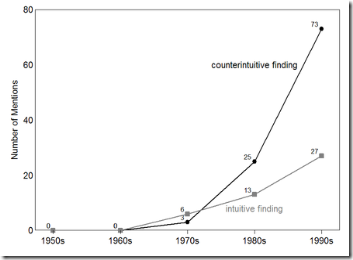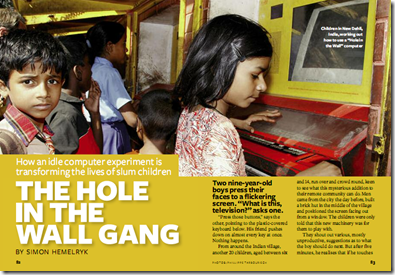- RT: @cblatts Funny because it’s true
- Comic book tribute to Levi-Strauss
- Women's rights make uneven advance in Middle East | FP Passport
- New blog: Save the Children in Southern Sudan
- Farm aid from space
- Sudanese secession: "Like a divorce when you have kids"
- Bashir has been chased out of Yei lasting only 6 minutes. They haven't forgotten the Antonovs
- @texasinafrica read this first on geography and haiti
- Fidgeting is good for you
- UN Calls for Less Foreign Interference in Somalia. Er....
07 March 2025
Weekly Twitter Links
The Other Brain Drain
There’s been a lot here recently about the gains from Africa’s Brain Drain to the developed world.
06 March 2025
Whither the Resource Curse?
The backlash is coming!
Apparently, economists are now discovering that getting more money doesn’t always make you poorer.
Who woulda thought it!
What we seem to have experienced over the past few years is a massive smart-arsed-economist Freakonomics-syle “counterintuitive finding”-obsession FAIL.
Yes, free money accruing to governments (resources or aid) probably doesn’t do much for their accountability, but does this governance effect really outweigh the free-money effect? Are the institutional effects of free-money so damaging that free money makes countries poorer? Or are we just trying too hard to be clever and “counterintuitive.”?
(As a final aside - the resource/aid/free-money curse only exist when the money is flowing to the government. Giving oil revenues or aid directly to poor people rather than to their governments is obviously logistically more difficult, but ameliorates this problem entirely).
“World Bank to give $125 million for health, road programs in South Sudan”
Is today’s headline in the Tribune. Except it isn’t. The World Bank is not “giving” $125 million. The World Bank is making a disbursement of donor money from a fund which it manages. The World Bank is a management consultant here.
This kind of confusion is why we need more explicit contracts and unbundling of aid donations from project implementation (and fund management).
For the 10 hundredth time - go and read Beyond Planning now.
Happy Birthday Roving Bandit
I’m a few days late but I just realised that I started this thing just over a year ago. My first post was 3rd March 2009.
I’m afraid that I have no profundities (for that - try Andrew Sullivan - Why I Blog), except to say thanks for reading and for all your comments. I really couldn’t have imagined it going any better. So, if you keep reading, I’ll keep writing.
05 March 2025
Social Networks for Development
I’ve been chatting to Sam Lampert and a colleague about Beyond Planning and what the ultimate social network for development would look like.
I think the big idea is already out there. It is Ushahidi, which aggregates and maps information submitted online or by SMS during elections and crises. But why stop at crises? Why not just have a system which is always on and which can allow citizen reporting on public services?
How about a massive global wikipedia for aid spending, government spending, and politics, with Facebook Connect so contributor’s reputations are at stake, and maps, and links to MP profiles, and voting buttons on public projects, and voting buttons on public projects linked to SMS, which are advertised on the radio (“how is your local school doing? text your marks out of 10 along with your district name to 1234”), and detailed user reviews of projects, and league tables, and links to public data on project spending. Aid and Government projects all in the same place. Aid transparency, government transparency, political transparency, all in the same place.
Geeks of the world - any takers?
04 March 2025
Time for a Fiscal Policy Committee (FPC)
“The financial crisis has brought large fiscal deficits and soaring public debt. A switch to tight fiscal policy risks throttling the recovery, but continuing deficits are spooking markets. This column argues the obvious solution is to promise future fiscal rectitude and stick with the current expansionary policies in the near term. This requires independent fiscal policy committees to institutionalise fiscal transparency and restore credibility to governments’ long-term public finances.”
Tim Besley and Andrew Scott on VoxEU
02 March 2025
Seeing as Tourism is the new magic bullet…
(I’m joking Ranil!) But did I mention how great Logali House is? There is little better than a nice air-conditioned room in the height of the dry season when you haven’t slept for a week because of the heat.
By the way, to any other Juba businesses - I am totally for sale. I will plug you relentlessly for freebies.
Quote of the Day (QotD) - On Football and Marxism
I do love Chris Dillow…
“There’s a parallel between Arsene Wenger’s criticism of that tackle on Aaron Ramsey and Marx’s critique of capitalism.
…
In this context, Pulis’s defence of Shawcross, though factually correct, is pernicious. In encouraging us to look at individual agency, rather than structural forces, it perpetuates one piece of ideology/cognitive bias - the fundamental attribution error - which helps to sustain and legitimate capitalism.”
The Hole in the Wall Gang
(Photo from Reader’s Digest)
In 1999, Sugata Mitra and his colleagues dug a hole in a wall bordering an urban slum in New Delhi, installed an Internet connected PC, and left it there (with a hidden camera filming the area). What they saw was kids from the slum playing around with the computer and in the process learning how to use it and how to go online, and then teaching each other.
In the following years they replicated the experiment in other parts of India, urban and rural, with similar results, challenging some of the key assumptions of formal education. The "Hole in the Wall" project demonstrates that, even in the absence of any direct input from a teacher, an environment that stimulates curiosity can cause learning through self-instruction and peer-shared knowledge. Mitra, who's now a professor of educational technology at Newcastle University (UK), calls it "minimally invasive education."
The TED talk is here.
The academic papers are here.
The blog is here.
The article explaining how this guy was the inspiration for the plot of Slum-dog Millionaire is here (WTF?!!!).
I am in awe at how cool this. How about this as a solution for pastoralist education in remote Southern Sudan? Can you begin to imagine how the world will look when NGOs are handing out $100 iPhones to kids tending cows in cattle-camps, and there is free global wi-fi access?
Missionaries and Aid
“A root problem is a liberal snobbishness toward faith-based organizations. Those doing the sneering typically give away far less money than evangelicals. They’re also less likely to spend vacations volunteering at, say, a school or a clinic in Rwanda.”
Nick Kristof writes in defence of faith-based aid in the New York Times. Blattman agrees but Matt seems to be sceptical.
I am a bit of a Dawkins-reading-militant-atheist, but I have to say I have complete respect for the individuals who take their kids to non-family duty stations, stay longer than average aid workers, and work tirelessly.
Here’s a cool idea from Matthew Taylor

Give a small incentive (~£3o) for the unemployed to fill in their claims online - and save a bunch of money in staffing offices. Improve IT literacy in the process.
“a way of saving money, promoting social inclusion and contributing to the vision of digital Britain. Don’t be surprised to read it in a manifesto very soon.”
Just don’t get too carried away and forget about the importance and effectiveness of the actual mortar-and-brick job centres which require claimants to actually go and chat to an job-search advisor once a fortnight to keep on claiming.
The Sierra Leone Guide to Prevention of Tourism
Mark Weston makes fun of Sierra Leone’s tourism non-policy.
He has a point though, what is the elasticity of tourist arrivals to visa fees? More broadly what are the determinants of tourist arrivals? Any research here?
I have a theory about the political economy of this. Poor country governments tend to be bad at taxing people. By far the easiest way is at ports. How about instead giving out free visas but increasing taxes on major tourist attractions (e.g. national park entry)?
01 March 2025
Weekly(ish) Twitter Links
- Polly Toynbee goes all anti-poor people
- Effective Habits of Budget Advisors (via MTEF)
- Sam Lampert's plea for developing country eGovernment solutions
- Niger coup Haiku by Paul Currion
- Great short article by Maggie Fick about life in Juba in the Guardian
- IMF sides with Labour on the UK deficit
- Collier on NGO accountability in Haiti
- RT: @CGDev Nancy Birdsall has a list of ten actionable items for promoting global prosperity this year. Any additions?
- Guest workers in Dubai sent home $10 billion in 2010. That is 10% of the entire global aid budget.
- Why are coups always led by colonels?
- RT @developingjen Reading Duflo/Banerjee's 'Putting a Band-aid on a Corpse: Incentives for Nurses in the Indian Public Health Care System' Optimistic are we?
- Four Ways Brain Drain out of Africa is a good thing
- Matt @ aidthoughts on ForeignPolicy.com
- Answer your critics Bill!
- RT @solarafrica Every 8 days as many children die from poverty as the number of people died in the Haiti earthquake - Esther Duflow #TED. via @hungerbites
- New google maps for Africa
- Guinea pig meat may be solution to Congo hunger crisis (via econwatson)
- Carter Center close to eradicating Guinea worm from the face of the earth. Aid specialisation Works.
- via @owenbarder aid effectiveness briefing paper from ODI (by my classmate Cecilie!)
- Will Wilkinson likes pie. And the United Nations Fallacy. Me too. (via PhilipBlue via cblatts)



